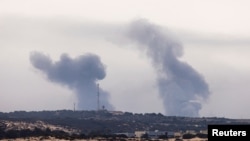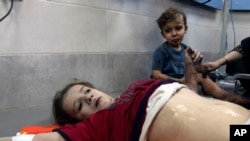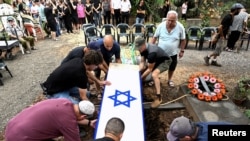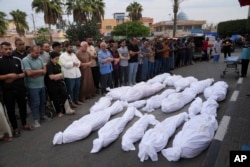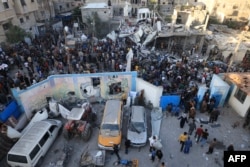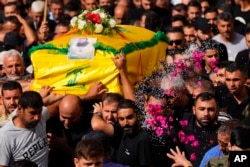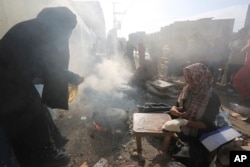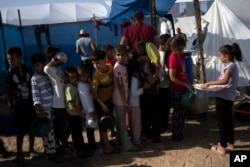Latest Developments:
- Israel’s military conducts ground incursion into Gaza for the consecutive second day, followed by a barrage of fresh airstrikes.
- Pentagon says U.S. military launched airstrikes early Friday on two locations in eastern Syria linked to Iran’s Revolutionary Guard Corps.
- Israel says 1,400 people killed since Oct. 7's Hamas attack
- Gaza health officials say move than 7,000 Palestinians killed in Israeli airstikes.
- UNRWA chief, who confirms 57 staff members killed in Gaza since war began, including 15 in one day, announces plan to visit Gaza.
Israel’s military said late Thursday it again carried out a ground operation in the Gaza Strip, where Israeli forces have been conducting airstrikes targeting Hamas militants for nearly three weeks.
The Israel Defense Forces said the raid was brief as its tanks and infantry engaged Hamas fighters and struck anti-tank weapons before returning to Israeli territory.
The IDF operation — the second of its kind in as many days — was its latest incursion as it makes preparations for a promised full-scale ground invasion.
Additional airstrikes, which have ravaged swaths of the Gaza Strip, where residents are running out of food, water and other supplies, followed the latest incursion. Meanwhile, the U.S. military launched airstrikes early Friday on two locations in eastern Syria linked to Iran’s Revolutionary Guard Corps, according to Pentagon press secretary Brig. Gen. Pat Ryder.
“These precision self-defense strikes are a response to a series of ongoing and mostly unsuccessful attacks against U.S. personnel in Iraq and Syria by Iranian-backed militia groups that began on October 17,” Secretary of Defense Lloyd Austin said in a statement.
Israeli officials have pledged to ensure Hamas can no longer carry out attacks that threaten Israel following its October 7 massacre of about 1,400 people, mostly civilians.
The death toll in Gaza has reached at least 7,000 people, the majority women and children, according to Gaza’s Ministry of Health. The ministry, which tracks the death toll, released a detailed list of names and ID numbers on Thursday, including more than 2,900 minors and more than 1,500 women.
World Health Organization official Richard Peeperkorn said on Friday the agency had received estimates that some 1,000 unidentified bodies are still buried under the rubble in Gaza which are not yet included in death tolls, according to Reuters. Peeperkorn did not specify the source.
In an early Friday press conference, Philippe Lazzarini, commissioner-general of the U.N. Relief and Works Agency for Palestine Refugees, or UNRWA, in the Near East, confirmed that 57 staff members have been killed in Gaza since war began, including 15 in one day.
Lazzarini denied accusations that aid was being diverted to Hamas militants and said he plans “to visit Gaza, to express solidarity and amplify the voice of the communities and our staff.”
“Gaza is where I was when I started my career as a humanitarian more than 30 years ago,” he said. “This is where I need to be today.”
European Union leaders on Thursday called for pauses in Israeli bombing and Hamas rocket attacks to allow humanitarian aid into Gaza.
At a summit in Brussels, the leaders of the EU’s 27 countries expressed the "gravest concern for the deteriorating humanitarian situation in Gaza."
The European leaders called for "continued, rapid, safe and unhindered humanitarian access and aid to reach those in need through all necessary measures including humanitarian corridors and pauses for humanitarian needs."
The Israeli military has called up 300,000 reservists and stationed troops near the Gaza border.
Israeli Prime Minister Benjamin Netanyahu, in a televised statement Wednesday, said Israel was "preparing for a ground invasion. I will not elaborate on when, how or how many."
Benny Gantz, a retired general and member of Netanyahu’s war Cabinet, said any ground offensive would be only "one stage in a long-term process that includes security, political and social aspects that will take years."
"The campaign will soon ramp up with greater force," he said.
Defense Minister Yoav Gallant said Israel has no interest in expanding the war front beyond Gaza, although it is prepared to fight Iranian-backed Hezbollah fighters based in Lebanon.
"We are waging war on the southern front against Hamas, prepared for any development in the north. Hezbollah is suffering many losses,” Gallant told reporters.
A senior Hamas political official speaking to The Associated Press in Beirut late Thursday said the Palestinian militant group had expected stronger intervention from Hezbollah in its war with Israel. The comments, made by Hamas political bureau member Ghazi Hamad, were a rare public appeal by Hamas to its allies in the region.
A delegation from Hamas visited Moscow late Thursday for talks on the release of foreign hostages including Russian citizens that the militant group is currently holding in Gaza, Russian news agencies reported, citing the foreign ministry.
U.S. Senator Ben Cardin, the Democratic chairman of the Senate Foreign Relations Committee, who was part of a congressional delegation that recently visited Israel, said it was up to Israeli leaders to decide when to launch any ground invasion into Gaza.
"We have not called for a delay,” Cardin told VOA. “I think every day, we think it's going to be that day or night or the next day. So, Israel is going to do when they want to do it. It is their judgment."
“It was clear to all of us that Hamas is evil,” Cardin said. “That they are comparable to ISIS, that their objective is to prevent a Jewish state from existing in the Middle East. They believe it's right to execute Jews that pose no threat to them and have taken a page out of the Nazi book. And I think we all agreed that they have to be taken down — that there is no future for the Palestinians with Hamas in Gaza."
Meanwhile, the United Nations humanitarian aid agency said that from last Saturday through Tuesday, 62 trucks with water, food and medical supplies traveled through the Rafah crossing at the Egyptian border into Gaza. But that total was far short of the daily average of 500 trucks allowed into Gaza before the hostilities.
U.N. World Food Program Executive Director Cindy McCain told Reuters on Thursday that unduly strict checks on trucks at the Rafah crossing had slowed the flow of aid to a “dribble.”
"We’ve gotten a few — a dribble, just a dribble — of trucks in," McCain said. "We need to get a large amount in. We need safe, unfettered access into Gaza so that we can feed and make sure that people don’t starve to death, because that’s what’s happening."
Belgian Prime Minister Alexander De Croo, meanwhile, warned Israel on Thursday against starving Gaza.
“Israel has a right to take action and to prevent future attacks. But that is never an excuse for blocking a whole region, for blocking humanitarian aid. It cannot be an excuse to starve a population,” he said at the EU summit.
Despite limited food deliveries, Israeli authorities have continued to ban fuel transports into Gaza for fear Hamas militants will take it for their own use.
Some 1.4 million people in Gaza are internally displaced, with some 629,000 staying in 150 UNRWA-designated emergency shelters. Officials are worried about overcrowding, with the average number of displaced people per shelter now 2.7 times their designated capacity.
Wire news outlets citing local media reported early Friday that a missile launched as part of fighting between Hamas militants and Israel struck the Egyptian resort town of Taba, which lies some 220 kilometers south of the Gaza Strip.
Al-Qahera news, which has close ties to Egypt’s intelligence service, reported that six people suffered minor injuries in the strike, which hit near a medical facility where ambulances were parked, and that an investigation is underway.
Congressional correspondent Katherine Gypson contributed to this report. Some information for this report came from The Associated Press, Reuters and Agence France-Presse.




